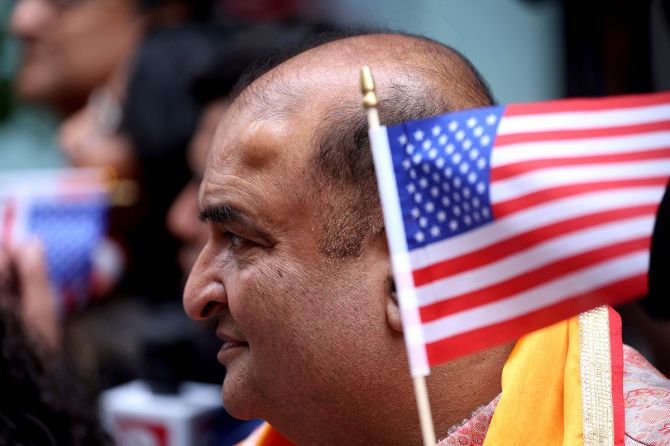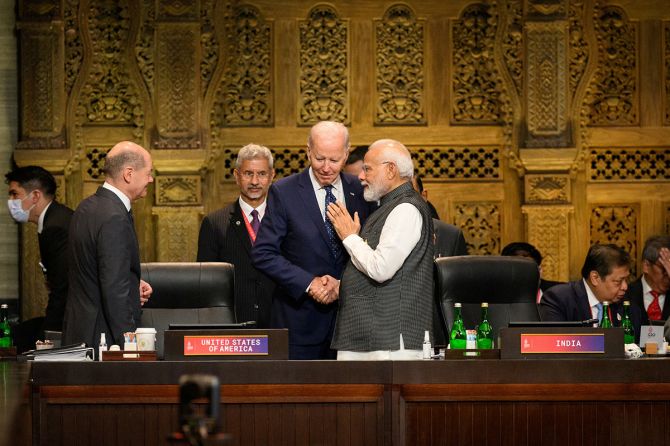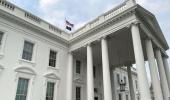'This is still a relatively immature defense and high-tech relationship.'

Like all of Narendra D Modi's previous six visits to the United States as prime minister, and to other places, where the Indian diaspora is present in robust cheerleading numbers, his ongoing seventh America trip began with the usual... Adulation. Pride. The pandemonium of followers scrambling to get even the tiniest sliver of a view of the Indian prime minister.

This is Modi's first State visit to the US since he came to power nine years ago, and the third State visit in the Biden administration -- French President Emmanuel Macron and South Korean President Yoon Suk Yeol were the others leaders accorded this honour.

Richard M Rossow is the chair in US-India Policy Studies at the Center for Strategic and International Studies, a think-tank in Washington, DC. He has devoted 16 years to nurturing, helping build and reinforcing the partnership between the US and India.
Before CSIS, he led the tasks his firm, McLarty Associates, undertook for clients in India. McLarty Associates was set up by Thomas F 'Mack' McLarty, one of Bill Clinton's oldest friends from Arkansas, who also served as the then president's chief of staff.
Rossow was also the deputy director of the advocacy group, the US-India Business Council, for a fruitful decade from 1998 to 2008.
"Our governments are working hard on concrete ways to build trust, but the biggest sign-posts on this journey will come when we face real threats -- like our differing positions on Russia's invasion of Ukraine -- and the relationship survives intact," Roussow tells Vaihayasi P Daniel/Rediff.com in an illuminating e-mail interview.

Not even 15 months ago, one of President Biden's top economic advisers said. 'the costs and consequences' for India would be 'significant and long-term' if India did not pick sides in the Ukraine war.
Much has changed since then with everyone now looking forward to a 'transformational moment' in US-India ties with Narendra Modi's State visit. How did that happen? And why?
We have found that the reasons for building our partnership -- shared concerns about the dangerous elements of China's rise, and opportunities to work on shared economic opportunity -- are accelerating quickly.
These positive elements to our relationship help offset areas of friction, like our differing views on Russia's invasion of Ukraine. Russia's deepening security relationship with China also plays a role in Delhi's changing views.
I saw a Twitter comment by a respected India watcher that basically suggested that democratic values should not be the foundation of the US-India relationship and has not really worked well in the past.
Instead of common values, the relationship in the future should be about common interests or rather shared interests.
Would you agree to both parts of this contention? And how would this work?
American and Indian citizens both enjoy our own democratic rights.
But we differ on how, and whether, to project these values externally. The United States goes through periods, where promoting democracy abroad is central to foreign policy; often followed by periods where we choose nations friendly to our interest, with little regard to their type of government.
India is more selective in its pursuit of democracy abroad -- often limited to supporting opposition forces in neighboring nations with 'pro-China' governments in place.
What kind of Diwali list should Mr Modi be coming to Washington with? And what should be Mr Biden's wish list be like?
The Modi government will want US assistance in sharing the intellectual property that underpins advanced US defence systems to help Indian production become higher-end and more self-sufficient.
India will want US support in its desire to supplant China as the manufacturing 'workshop of the world'. India wants a reduction in barriers to immigration and other forms of people-to-people ties.
And India would like the United States to recognise -- and act upon -- the growing security threats in India's neighborhood.
The United States wants to find concrete ways to accelerate defense cooperation.
We would like to see India remove some of its domestic trade protections.
And the Biden administration would like to see Indian firms expand investments into the United States in critical areas like renewable energy.

How do you think this visit will play out for both sides? Mr Modi was able to establish a rapport with President Trump. What kind of chemistry will evolve between him and President Biden?
I suspect we will have less hugging and a lack of grandstand moments in sports stadiums. But we will have a very long list of concrete outcomes that expand our commercial, security, and people-to-people connections.

How shrewd is Prime Minister mODI considered in the foreign policy arena by India watchers in the US?
The US views on India's foreign policy remains mixed.
We appreciate India's more robust cooperation on threats emanating from China, and some work to improve India's relations with neighbours.
But we have concerns about India's continued soft position on Russia's invasion of Ukraine, lack of engagement in other key global challenges like the rise of ISIS, and a mixed record on trade policy.
If you were, on behalf of America, to hold up a mirror to India on where she is headed, what does India not see about herself?
I still believe India undervalues the strength and importance of state governments.
While the Modi government unleashed a program of 'cooperative/ competitive federalism', many Indian state leaders remain aloof when it comes to critical global issues.
Such positions are reflective of voter interest, of course. But I would like to see subnational cooperation more central to India's relations with the United States and key partner nations.
An Indian columnist recently commented: 'The US is not accustomed to being challenged by its partners. Its traditional Cold War-style alliances position the US as the 'hub' and its allies as the 'spokes. But this will never work with India, which is why the US goal is a 'soft alliance'.
Would you consider that true? What would be the key points of a soft alliance?
I like an earlier articulation of US-India cooperation as akin to a corporate 'joint venture'.
There is real utility in building this partnership, and our shared interest in regional security and economic cooperation will ensure we collaborate in key areas. But we cannot over-state the breadth of our relationship. It is focused on a narrow set of powerful issues -- China, strategic technology, and commercial relations.
We will have a harder time coming together on other global and bilateral issues.

There are views swirling about on how President Biden should be listening to the State Department and publicly articulate his concerns on India's human rights record. Will Mr Biden do that, do you feel? And will failure to do that and lack of honesty damage the strength of a future relationship between India and the US?
I believe President Biden and senior members of his team will find quiet opportunities to raise concerns about human rights and religious tolerance.
But they do not want such points to derail the good things we want to do together today and in the future.
Is there unprecedented trust between the US and India as Mr Modi told The Wall Street Journal?
Trust can only be earned over long periods of time.
This is still a relatively immature defense and high-tech relationship. Our governments are working hard on concrete ways to build trust, but the biggest sign-posts on this journey will come when we face real threats -- like our differing positions on Russia's invasion of Ukraine -- and the relationship survives intact.










